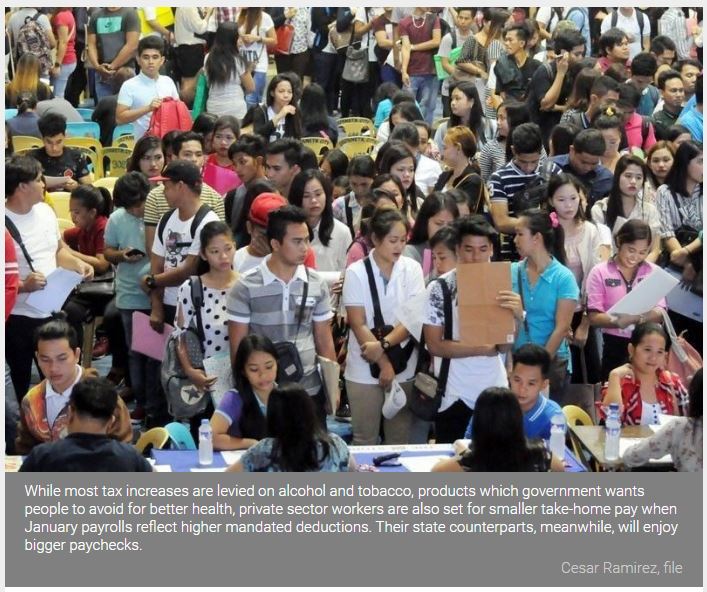Philippines: Economy will rise next year. Taxes, charges, and salaries, too
MANILA, Philippines — Filipino consumers still reeling from pandemic-induced joblessness are set to be pounced by higher taxes and premium contributions to social services next year.
While most tax increases are levied on alcohol and tobacco, products which government wants people to avoid for better health, private sector workers are also set for smaller take-home pay when January payrolls reflect higher mandated deductions. Their state counterparts, meanwhile, will enjoy bigger paychecks.
This means weaker purchasing power for most consumers, whose spending represent 70% of annual economic output. Add an outperforming peso to the mix, and Filipinos reliant on earnings from migrant workers are facing a tough 2021 to deliver a compelling economic recovery.
“These (higher taxes) are largely on non-essentials, and we have seen that demand has collapsed and majority tilted on essential goods and services,” Ruben Carlo Asuncion, chief economist at UnionBank of the Philippines, said in an online exchange on Wednesday.
‘Sin’ taxes up
Under Republic Act 11467 enacted last January, excise taxes on tobacco and alcohol products will increase every year until 2023, after which levies will automatically rise 5% each year. The measure aims to deter smoking and drinking habits, while raising revenues for President Rodrigo Duterte’s flagship healthcare-for-all program.
For 2021, distilled spirits will be slapped a P47 tax per proof liter, up from the current P42. The charge will come on top of a 22% ad valorem tax of the net retail price of these products.
Meanwhile, excise on fermented liquors will likewise go up to P37 per liter from P35.
Heated tobacco products will be charged a P27.50 levy per pack containing 20 units, up from the present P25. Vapor products, which have become a fad alternative to cigarettes, will also be taxed P42 and P50, depending on nicotine content.
Low-cost homes to get taxed
In addition to sin products, the Duterte administration will also proceed with lowering the threshold for tax-exempt residential houses despite repeated appeals from developers to postpone the measure because sales have suffered from the pandemic.
Beginning next month, shelters worth P2 million and above will be charged a 12% value-added tax to be passed on to buyers. Currently, only homes sold at P3.2 million and above are taxable. “Our appeals have gone unanswered,” Rosie Tsai Wang, president of the Subdivision and Housing Developers Association Inc., an industry group, said in November.
SSS contributions rise
The Social Security System (SSS), the pension fund for the 68 million private sector workers, would also raise its monthly contribution rate to 13% from 12%, with the bulk of the amount shouldered by employers. Once the increase is implemented, monthly earners of P24,750 and above would pay monthly premiums of P2,600. Currently, maximum earners of P19,750 and above pay only P2,430 a month.
The Employers Confederation of the Philippines, an industry group, has likewise called for the postponement of the additional premium, arguing businesses are still struggling to recoup losses from three months of lockdowns. But Finance Secretary Carlos Dominguez III, who concurrently serves as SSS chair, did not budge.
“Any drop in collections may lead to cash flow and liquidity issues. This could endanger the SSS’ ability to provide its members and their beneficiaries with benefits and loan privileges,” Dominguez said in a statement on Wednesday.
PhilHealth premium increases, too
Republic Act 11223 or the Universal Healthcare Law also mandates the Philippine Health Insurance Corp. (PhilHealth) to raise premiums to 3.5% of monthly income from the current 3%. The income ceiling to which the premium is charged would also be lifted to P70,000 from P60,000.
That said, it is typical for agencies to issue a separate order to implement and inform the public of the changes, similar with what SSS has done this month. Sought for comment, PhilHealth spokesperson Rey Balena said the agency “will issue a statement on this” soon. Earlier, PhilHealth warned its fund risk getting depleted as early as next year due to hefty coronavirus costs.
Government workers to see bigger paychecks
For government workers, Budget Secretary Wendel Avisado confirmed that the P4.5-trillion budget for next year contains funding to increase the salaries of 1.9 million workers of the national government. The impending adjustment is the second tranche of the Salary Standardization Law of 2019.
“Funds for that are already built in on each agency budget for personal services,” Avisado said in a text message.
Lower taxes for companies set
Unlike consumers, companies may expect lower taxes next year as legislators finalized the Corporate Recovery and Tax Incentives for Enterprises (CREATE) bill. The measure, a priority of the Duterte administration, will lower the corporate income tax rate to 25% from the current 30% for firms with assets above P100 million and income exceeding P5 million. For smaller enterprises, the rate will go down to 20%. The measure, once enacted, will be implemented retroactively to July 2020.
Economic managers branded CREATE as one of its stimulus measures meant to put the economy back on its feet. Government is hoping savings from lower corporate taxes will be funneled by companies to more hiring and business expansion.
Source: https://www.philstar.com/business/2020/12/23/2065847/economy-will-rise-next-year-taxes-charges-and-salaries-too


 English
English




